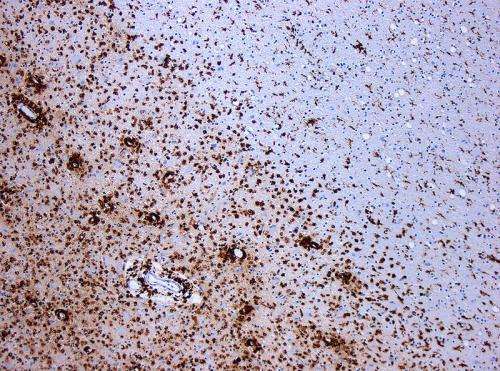New discovery provides hope for improved multiple sclerosis therapies

Scientists from Trinity College Dublin have made an important discovery that could lead to more effective treatments for people living with multiple sclerosis (MS) and other autoimmune diseases such as psoriasis and rheumatoid arthritis. Their work highlights the significant potential of drugs targeting a specific immune molecule (IL-17) implicated in MS.
The scientists, led by Kingston Mills, Professor of Experimental Immunology, and Aoife McGinley, Postdoctoral Fellow, in Trinity’s School of Biochemistry and Immunology have published their results today [Tuesday 4th February 2020] in the prestigious Cell press journal, Immunity.
Multiple sclerosis (MS) is a debilitating disease that affects around 2.3 million people globally and over 9,000 people in Ireland. It is associated with infiltration of immune cells into the brain and spinal cord that cause damage to nerves, leading to neurological disabilities.
However, the cause and precise immunological basis to this autoimmune disease is still unclear.
Studies in a mouse model of MS, called experimental autoimmune encephalomyelitis (EAE), have shown that immune ‘T cells’, which secrete an immune molecule called ‘IL-17’, cause damage to the myelin sheath that surrounds nerves in the central nervous system (CNS).
Early clinical trials with antibody-based drugs that block IL-17 are showing promise in the treatment of relapsing-remitting (RR) MS and have already been licensed for the treatment of psoriasis, another common autoimmune disease.
The just-published study from Professor Mills’ research group outlines an entirely new role for IL-17 in EAE and, potentially, in MS.
Professor Mills said:
“Our team found that IL-17 plays a critical ‘priming’ role in kick-starting the disease-causing immune response that mediates the damage in EAE and MS.”
“The new research shows that, instead of playing a direct part in CNS pathology, a key role of IL-17 is to mobilise and activate an army of disease-causing immune cells in the lymph nodes that then migrate to the CNS to cause the nerve damage.”
Dr. Aoife McGinley added:
“Crucially, our findings suggest that drugs that block IL-17 may not need to get across the blood-brain-barrier to be effective in treating MS.”
Source: Read Full Article


